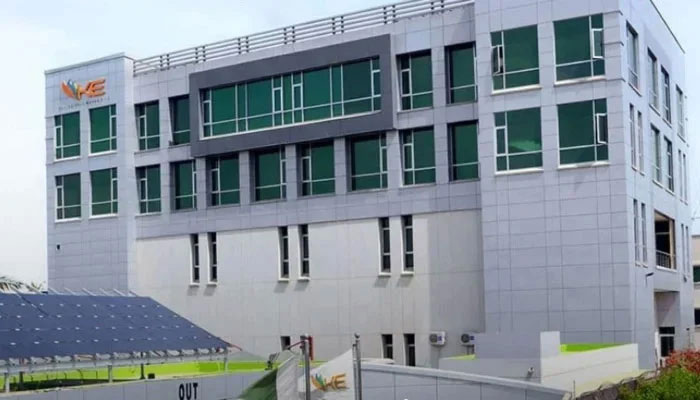K-Electric gets Nepra’s nod for 320MW renewable projects
Notably, authority had earlier approved generation, transmission and distribution tariffs for FY2024 to FY2030 control period
ISLAMABAD: K-Electric Ltd. won a key regulatory nod to fast-track 370 MW of renewable energy capacity, after the National Electric Power Regulatory Authority (Nepra) approved its bid evaluation reports for three major clean power projects—two solar PV farms in Balochistan and a hybrid project at Dhabeji—clearing the way for formal tariff filings under the country’s national energy framework.
The greenlit portfolio includes a 100 MW solar plant in Bela and a 50 MW installation in Winder, both awarded to Master Textile Mills Ltd.
Nepra also approved KE’s proposed 220 MW hybrid project at Dhabeji, which offers a flexible mix of solar, potential wind or storage solutions, and includes a 20pc capacity margin to enhance grid stability. The project fits squarely within the Indicative Generation Capacity Expansion Plan (IGCEP) and Power Acquisition Plan (PAP), Pakistan’s primary planning tools for energy infrastructure. To protect consumers, the Nepra ruled that any project delays—whether by KE or the developers—must not result in additional charges to end-users. This safeguard is to be hardcoded into project agreements.
Beyond renewables, the regulator reviewed KE’s transition roadmap to the Competitive Trading Bilateral Contract Market (CTBCM)—a sweeping reform to liberalize Pakistan’s electricity sector. While hurdles remain, including legacy power purchase agreements and the need for a revamped capacity invoicing mechanism, NEPRA directed KE to align its operations with the central dispatch model and file a revised tariff petition reflecting these reforms.
Meanwhile, Nepra on Tuesday raised the average base tariff for K-Electric by Rs6.15 per unit — an 18.18% increase, setting it at Rs39.97/unit for fiscal year 2023-24 under a newly approved Multi-Year Tariff regime stretching to FY2030. The hike backs a Rs400 billion investment plan while cushioning against under-recovery risks to maintain power supply across Karachi.
Notably, the authority had earlier approved generation, transmission and distribution tariffs for the FY2024 to FY2030 control period.
According to Nepra’s determination issued on Tuesday, the new tariff structure includes Rs31.96/unit for power purchase excluding transmission charges, Rs2.86/unit for transmission cost, Rs3.31 for distribution cost, Rs2.28 for supply margin, and a negative Rs0.44 per unit adjustment on account of prior year adjustments. The decision said that the adjustments are vital for sustaining KEs Rs400 billion ($1.42 billion) investment plan over the next seven years duly approved by NEPRA. It also mentioned that ICE has successfully halved its line losses post-privatization and continues to address issues like illegal connections (kundas) that stem from unplanned urban sprawl. KE says its $700 million investment and reinvested profits have driven $4 billion in post-privatization upgrades, aligning returns with dollar-based benchmarks used by IPPs and IHVDC.
-
 Gwyneth Paltrow Reveals Deep Personal Connection With Kate Hudson
Gwyneth Paltrow Reveals Deep Personal Connection With Kate Hudson -
 Prince Harry, Meghan Markle’s Game Plan For Beatrice, Eugenie: ‘Extra Popcorn For This Disaster’
Prince Harry, Meghan Markle’s Game Plan For Beatrice, Eugenie: ‘Extra Popcorn For This Disaster’ -
 OpenAI To Rollout AI Powered Smart Speakers By 2027
OpenAI To Rollout AI Powered Smart Speakers By 2027 -
 Is Dakota Johnsons Dating Younger Pop Star After Breakup With Coldplay Frontman Chris Martin?
Is Dakota Johnsons Dating Younger Pop Star After Breakup With Coldplay Frontman Chris Martin? -
 Hilary Duff Tears Up Talking About Estranged Sister Haylie Duff
Hilary Duff Tears Up Talking About Estranged Sister Haylie Duff -
 US Supreme Court Strikes Down Trump’s Global Tariffs As 'unlawful'
US Supreme Court Strikes Down Trump’s Global Tariffs As 'unlawful' -
 Kelly Clarkson Explains Decision To Quit 'The Kelly Clarkson Show'
Kelly Clarkson Explains Decision To Quit 'The Kelly Clarkson Show' -
 Inside Hilary Duff's Supportive Marriage With Husband Matthew Koma Amid New Album Release
Inside Hilary Duff's Supportive Marriage With Husband Matthew Koma Amid New Album Release -
 Daniel Radcliffe Admits To Being Self Conscious While Filming 'Harry Potter' In Late Teens
Daniel Radcliffe Admits To Being Self Conscious While Filming 'Harry Potter' In Late Teens -
 Director Beth De Araujo Alludes To Andrew's Arrest During Child Trauma Talk
Director Beth De Araujo Alludes To Andrew's Arrest During Child Trauma Talk -
 Video Of Andrew 'consoling' Eugenie Resurfaces After Release From Police Custody
Video Of Andrew 'consoling' Eugenie Resurfaces After Release From Police Custody -
 'Harry Potter' Alum Daniel Radcliffe Gushes About Unique Work Ethic Of Late Co Star Michael Gambon
'Harry Potter' Alum Daniel Radcliffe Gushes About Unique Work Ethic Of Late Co Star Michael Gambon -
 Japan: PM Takaichi Flags China ‘Coercion,’ Pledges Defence Security Overhaul
Japan: PM Takaichi Flags China ‘Coercion,’ Pledges Defence Security Overhaul -
 Angorie Rice Spills The Beans On Major Details From Season 2 Of ' The Last Thing He Told Me'
Angorie Rice Spills The Beans On Major Details From Season 2 Of ' The Last Thing He Told Me' -
 Teacher Arrested After Confessing To Cocaine Use During Classes
Teacher Arrested After Confessing To Cocaine Use During Classes -
 Questions Raised Over Andrew Mountbatten-Windsor's Line Of Succession
Questions Raised Over Andrew Mountbatten-Windsor's Line Of Succession




